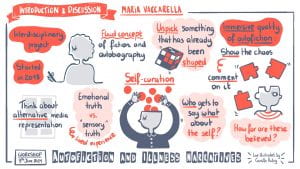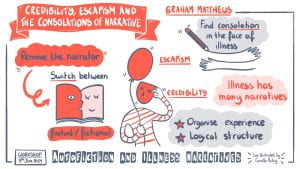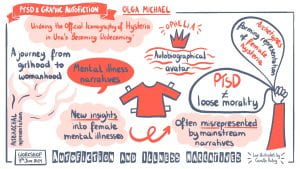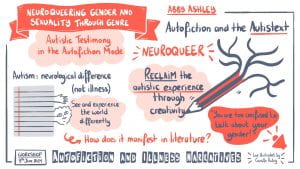These are the illustrations created live during our workshop today by Camille Aubry: they really capture the essence of a very productive morning. You can read more about today’s workshop on Twitter (search for #IllnessAsFiction).
Author: maria.vaccarella
Online workshop “Autofiction and Illness Narratives” (09/06/2021): registration now open!
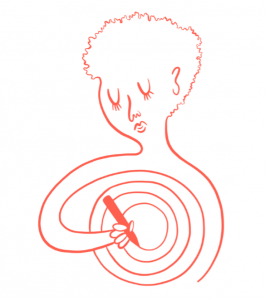
I’m delighted to announce that registration is now open for the workshop “Autofiction and Illness Narratives”, an exciting coda to this project!
The workshop will take place online on Wednesday 9th June 2021 10am-12pm BST. We will be joined by Graham Matthews (Nanyang Technological University, Singapore), Olga Michael (University of Cyprus), and Abby Ashley (University of Bristol) to learn more about their work at the intersection of autofiction, illness narratives scholarship, graphic medicine, and critical disability studies. The presentations will be followed by a discussion on how theories of autofiction can help us make sense of fake illness narratives and life-writing, more in general.
Attendance is free, but please email maria.vaccarella@bristol.ac.uk to book your place.
Workshop “Viral Stories” (25/01/19): registration now open!
I’m delighted to announce that registration is now open for our third and final workshop “Viral Stories”.

For the morning session, we will be joined by two guest speakers: Christopher Bass (Oxford), who will present his work on factitious disorder, and Anita Lavorgna (Southampton), who has worked on Belle Gibson in the context of deviant behaviour. The collaborative textual analysis session in the afternoon will be devoted to HIV/AIDS narratives this time.
Join us if you are interested in factitious illness memoirs, autofiction or, more in general, in the overlap between psychiatry, criminology, and literature!
Attendance is free and lunch will be provided, but places are limited, so please book here.
Looking forward to seeing you in Bristol on 25th January!
Illness as Fiction on the Imperfect Cognitions Blog
I was recently interviewed by Professor Lisa Bortolotti for her research blog Imperfect Cognitions: Lisa leads a research team working on delusional beliefs, distorted memories, confabulatory explanations, unrealistically optimistic predictions, and implicit biases — all topics that potentially overlap with fake illness narratives. You can read my interview here: I found the questions very inspiring, especially the (difficult!) one on the possible benefits of false accounts of illness. What do you think?
Illness as Fiction on “The Polyphony”
Head over to The Polyphony to read my reflection on Workshopping the Medical Humanities – my call for slow-paced, less packed, but more engaging academic meetings. The first workshop for Illness as Fiction gets a mention, too. Thanks to Katrina for facilitating all this!
Workshop “Malignant Fictions” (20/09/18): registration now open!
 Quinn Dombrowski,
Quinn Dombrowski,Unusually ood CC BY-SA 2.0
I’m delighted to announce that registration is now open for our second workshop “Malignant Fictions”.
For the morning session, we will be joined by two guest speakers: Sophie Stammers (Birmingham), who will present on confabulations, and Jurek Kirakowski (Cork), who will tell us about factitious disorder online. The collaborative textual analysis session in the afternoon will be devoted to cancer narratives this time.
Join us if you are interested in factitious illness memoirs, autofiction or, more in general, in the overlap between psychology and literature!
Attendance is free and lunch will be provided, but places are limited, so please book here.
Looking forward to seeing you in Bristol on 20th September!
Workshop “Texts as Symptoms” (09/07/18): registration now open!

I’m delighted to announce that registration is now open for “Texts as Symptoms” (and yes, the title is provocative!).
For the morning session, we will be joined by two guest speakers: Sue Vice (Sheffield), author of the foundational Textual Deceptions, and Katrina Longhurst (Leeds), who works on mental illness and the limits of autobiography. My own presentation will be on how factitious illness memoirs challenge illness narrative scholarship. The afternoon session will be more practical, as we will analyse a few extracts together.
Join us if you are interested in factitious illness memoirs or, more in general, in the blurry boundary between autobiography and fiction!
Attendance is free and lunch will be provided, but places are limited, so please book here.
Looking forward to seeing you in Bristol on 9th July!
Welcome!
This is the blog of my new research project “Illness as Fiction: Textual Afflictions in Print and Online.” I will post here news, workshop summaries, and reflections as the project develops. I am currently finalizing the details of our first workshop “Texts as Symptoms”, which will take place here at the University of Bristol on 9th July 2018 – more details soon!

In the meantime, let me give you a bit of background information. I got the first idea for this project, after reading this fascinating article by Rachel Monroe in The Guardian back in 2016: I learned a lot about Munchausen by Internet and I couldn’t but think that these accounts constituted an extreme version of the illness narratives I analyse in my job as a Lecturer in Medical Humanities. “Illness narrative” is a blurry definition: according to some scholars, for example Ann Jurecic, it includes all stories of illness and disability, whether biographical or fictional; others, like Anne Hawkins, prefer “pathography” to describe autobiographical accounts of illness. Munchausen by Internet complicates all this: what we read in blogposts or forum comments by a factitious patient is yes, a fiction, but it is also the textual manifestation of their psychiatric condition. Of course, Munchausen syndrome is not the only reason behind the publication of fake illness narratives. There might be marketing strategies at play, as it was maybe the case with James Frey’s best-selling A Million Little Pieces, perceived by many, and most notably by Oprah Winfrey, as an inspiring memoir of recovery from alcohol and drug addiction, and later revealed to be only partially truthful.
However, as a literary scholar, I am less interested in the “why” and more in the “how”: how do these authors manage to write convincing stories of illness or health-related trauma? Which stylistic devices do you they use to sound authoritative? And we, as readers, which features do we expect to find in plausible stories of ill health (e.g. detailed accounts of bodily sensations, alternative cures for untreatable diseases, etc.)? Follow this blog over the next months to find out more!

